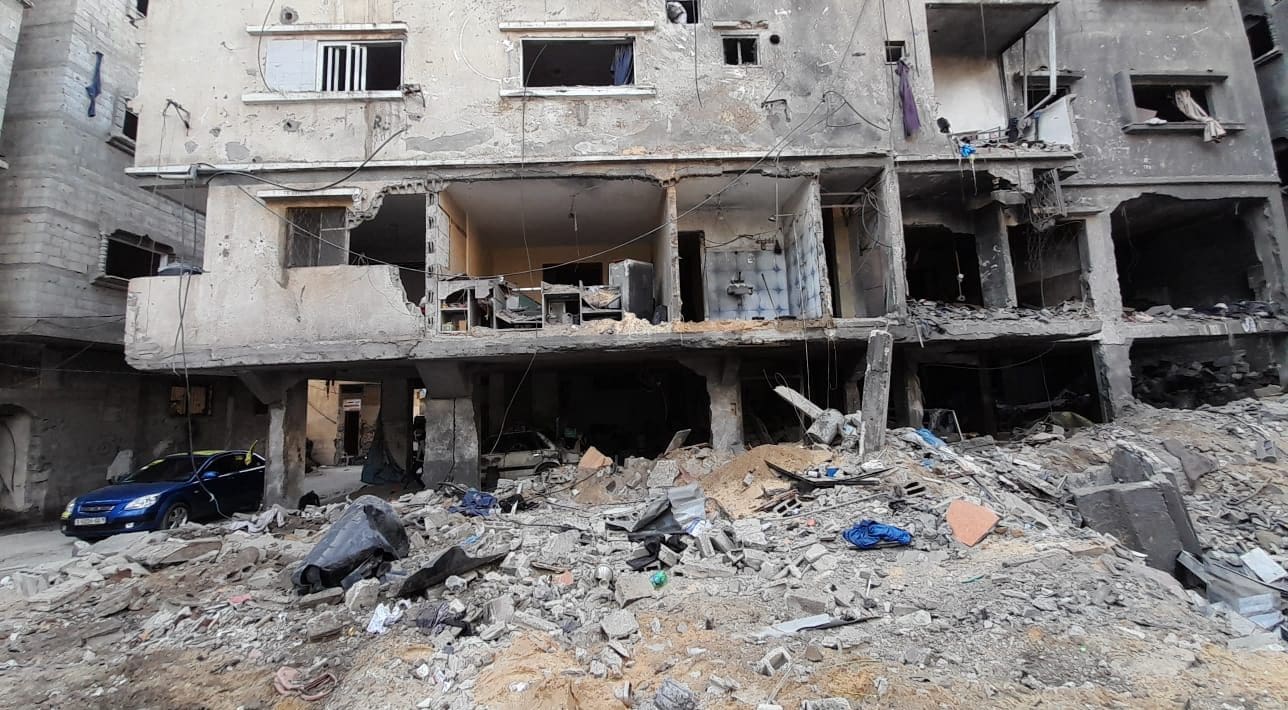- Fragments of US-made JDAM bombs found in rubble of homes destroyed by Israeli air strikes
- Attacks must be investigated as war crimes
- “US-made weapons facilitated the mass killings of extended families” – Agnès Callamard
US-made Joint Direct Attack Munitions (JDAM) were used by the Israeli military in two deadly, unlawful air strikes on homes full of civilians in the occupied Gaza Strip, Amnesty International has found based on a new investigation into those strikes. The organization found that these air strikes were either direct attacks on civilians or civilian objects or indiscriminate attacks and is calling for them to be investigated as war crimes.
The organization found distinctive fragments of the munition in the rubble of destroyed homes in central Gaza following two strikes that killed a total of 43 civilians – 19 children, 14 women and 10 men. In both cases, survivors told Amnesty International there had been no warning of an imminent strike.
“Amnesty International’s devastating research findings link US-made weapons to civilian killings. This demands urgent attention and action by President Biden and the U.S. Congress,” said Paul O’Brien, Executive Director of Amnesty International USA.
“The United States has an outsized role and responsibility to do everything in its power to ensure civilians are protected, including suspending the supply, sale, or transfer of arms until there is no longer a risk they will be used unlawfully. President Biden must practice what he preaches—the US must have measures in place to ensure it is not supporting violations of international humanitarian and human rights law through arms transfers.”
Paul O’Brien, Executive Director of Amnesty International USA
On October 10, an air strike on the al-Najjar family home in Deir al-Balah killed 24 people. On October 22, an air strike on the Abu Mu’eileq family home in the same city killed 19 people. Both homes were south of Wadi Gaza, within the area where, on October 13, the Israeli military had ordered residents of northern Gaza to relocate to.
“The fact that US-made munitions are being used by Israeli military in unlawful attacks with deadly consequences for civilians should be an urgent wake-up call to the Biden administration. The US-made weapons facilitated the mass killings of extended families,” said Agnès Callamard, Amnesty International’s Secretary General.
“Two families have been decimated in these strikes, further proof that the Israeli military is responsible for unlawfully killing and injuring civilians in its bombardment of Gaza.
“In the face of the unprecedented civilian death toll and scale of destruction in Gaza, the US and other governments must immediately stop transferring arms to Israel that more likely than not will be used to commit or heighten risks of violations of international law. To knowingly assist in violations is contrary to the obligation to ensure respect for international humanitarian law. A state that continues to supply arms being used to commit violations may share responsibility for these violations.”
Agnès Callamard, Amnesty International’s Secretary General
In light of the evidence of war crimes and other violations, the US must follow its own laws and policies regarding the transfer and sale of arms, including its Conventional Arms Transfer Policy and Civilian Harm Incident Response Guidance, which together are meant to prevent arms transfers that risk facilitating or otherwise contributing to civilian harm and to violations of human rights or international humanitarian law.
Amnesty International did not find any indication that there were any military objectives at the sites of the two strikes or that people in the buildings were legitimate military targets, raising concerns that these strikes were direct attacks on civilians. In addition, even if the strikes – which Israel has yet to provide any information about – were intended to target military objectives, the use of explosive weapons with wide-area effects in such densely populated areas could make these indiscriminate attacks. As such, these attacks must be investigated as war crimes.
Amnesty International’s weapons experts and remote sensing analyst examined satellite imagery, as well as photographs taken by the organization’s fieldworkers of the destruction of the targeted sites and of fragments of ordnance recovered from the rubble. Based upon the significant damage to the target and surrounding buildings, the bomb that struck the al-Najjar family home likely weighed 2,000lb. The bomb that hit the Abu Mu’eileq family destroyed their home and likely weighed at least 1,000lb.
In both attacks, the bombs used US-manufactured JDAM kits. The photos of the metal fragments from the weapons clearly show the distinctive rivets and harness system that indicate they served as a part of the frame that surrounds the body of the bomb of a JDAM. In addition, the codes stamped on the plates from both sets of recovered scrap, 70P862352, are associated with JDAMs and Boeing, the manufacturer. Additional codes stamped on the plates indicate that the JDAM that killed members of the al-Najjar family was manufactured in 2017, while the JDAM that killed members of the Abu Mu’eileq family was manufactured in 2018.
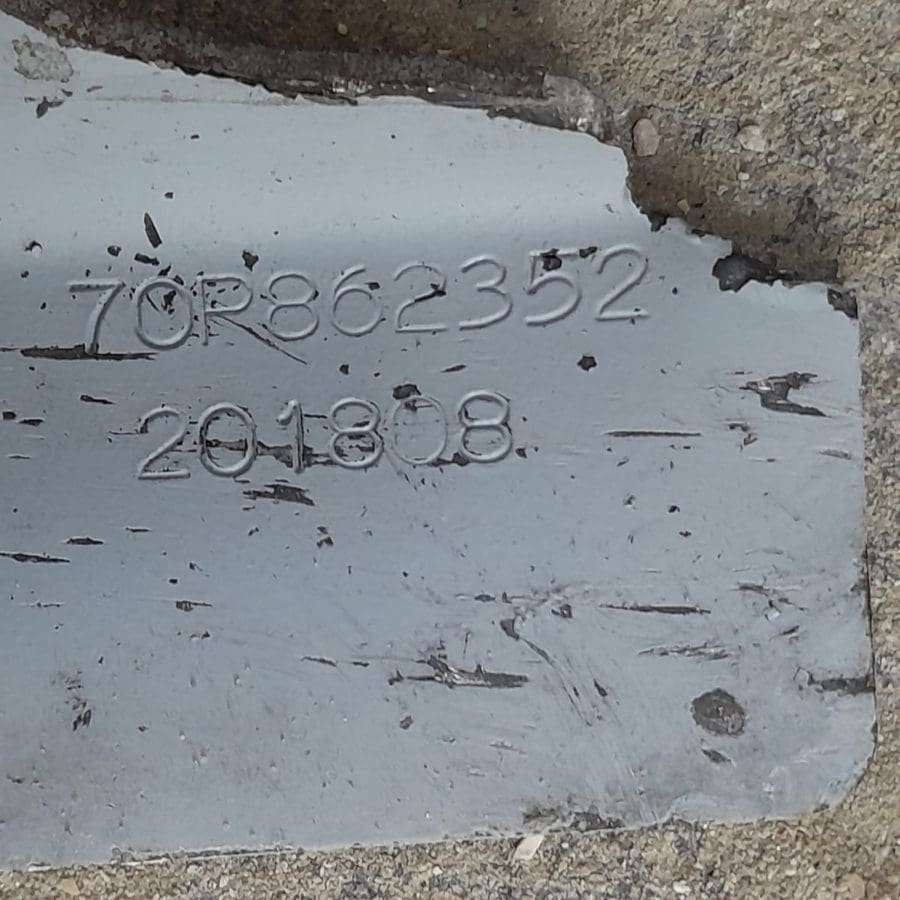
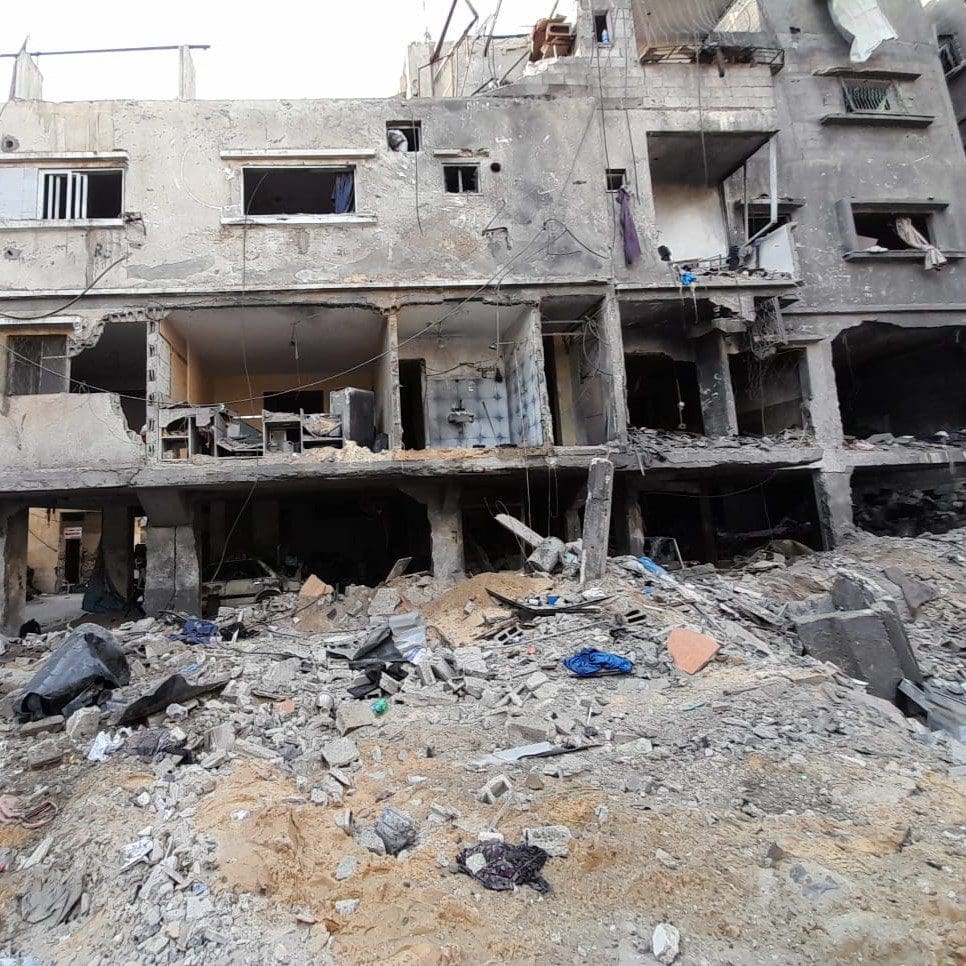
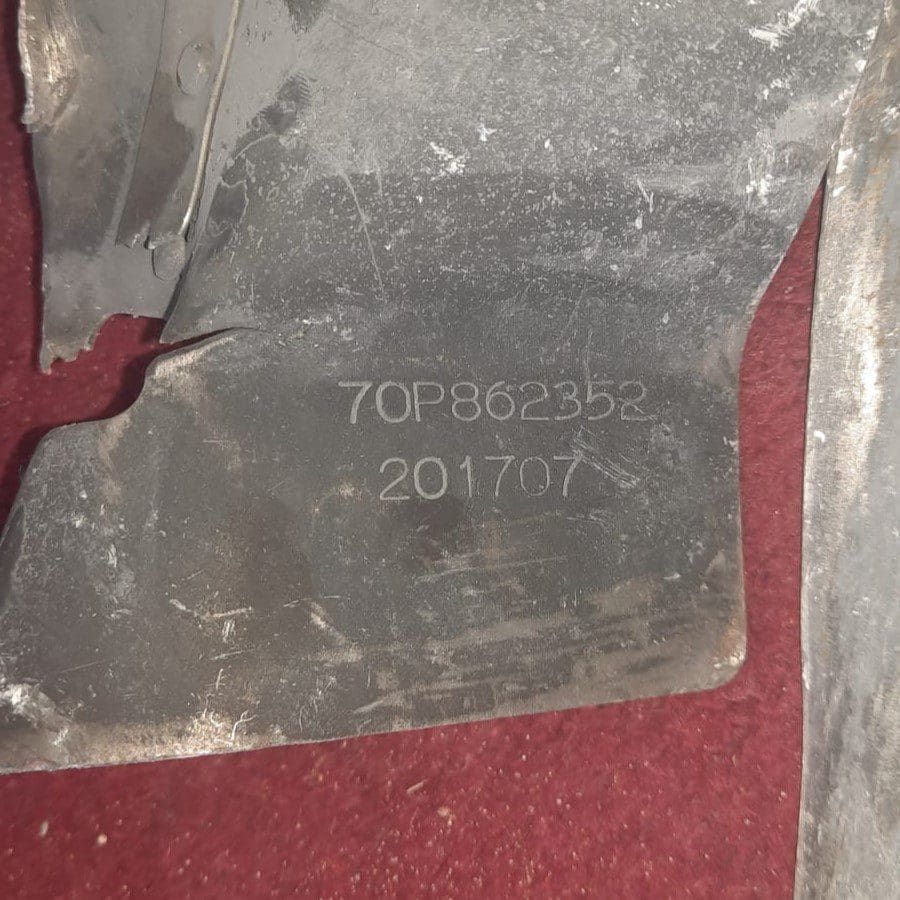
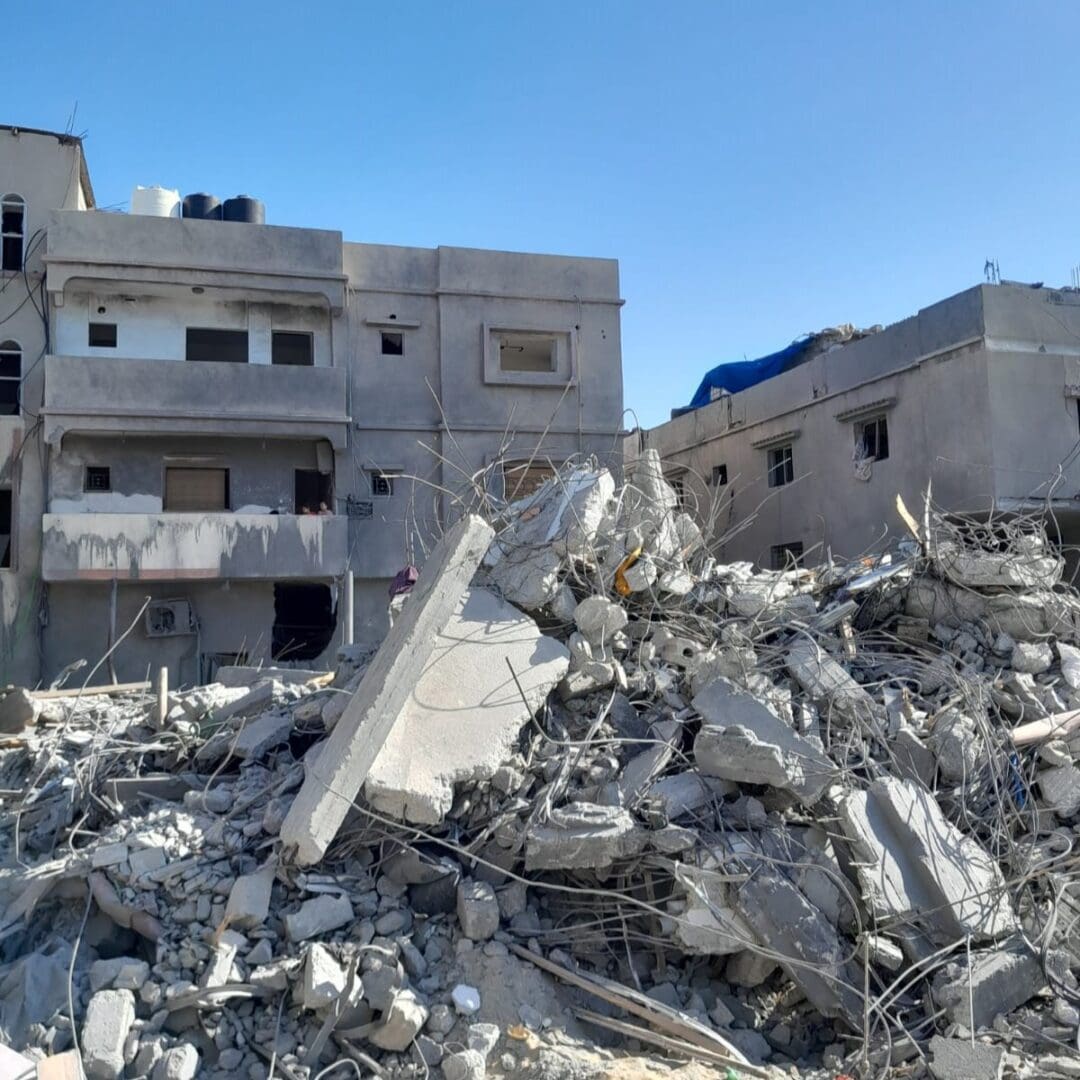
Amnesty International interviewed six survivors and relatives of the victims of the attacks, and also analysed satellite imagery, which showed destruction in the relevant locations during a period of time that was consistent with witness accounts. Amnesty International sent questions regarding the two attacks to the Israeli military’s spokesperson unit on 21 November. At the time of publication, no response had been received.
Amnesty International has long been calling on the UN Security Council to impose a comprehensive arms embargo on all parties to the conflict in Gaza and Israel. Amnesty International is also urging the prosecutor of the International Criminal Court to expedite the investigation opened in 2021 into war crimes and other crimes under international law committed by all parties.
Al-Najjar strike: ‘Our family has been destroyed’
On 10 October at approximately 8.30pm, an Israeli air strike killed 21 members of the al-Najjar family when the family home in Deir al-Balah was bombed. Three neighbours were also killed.
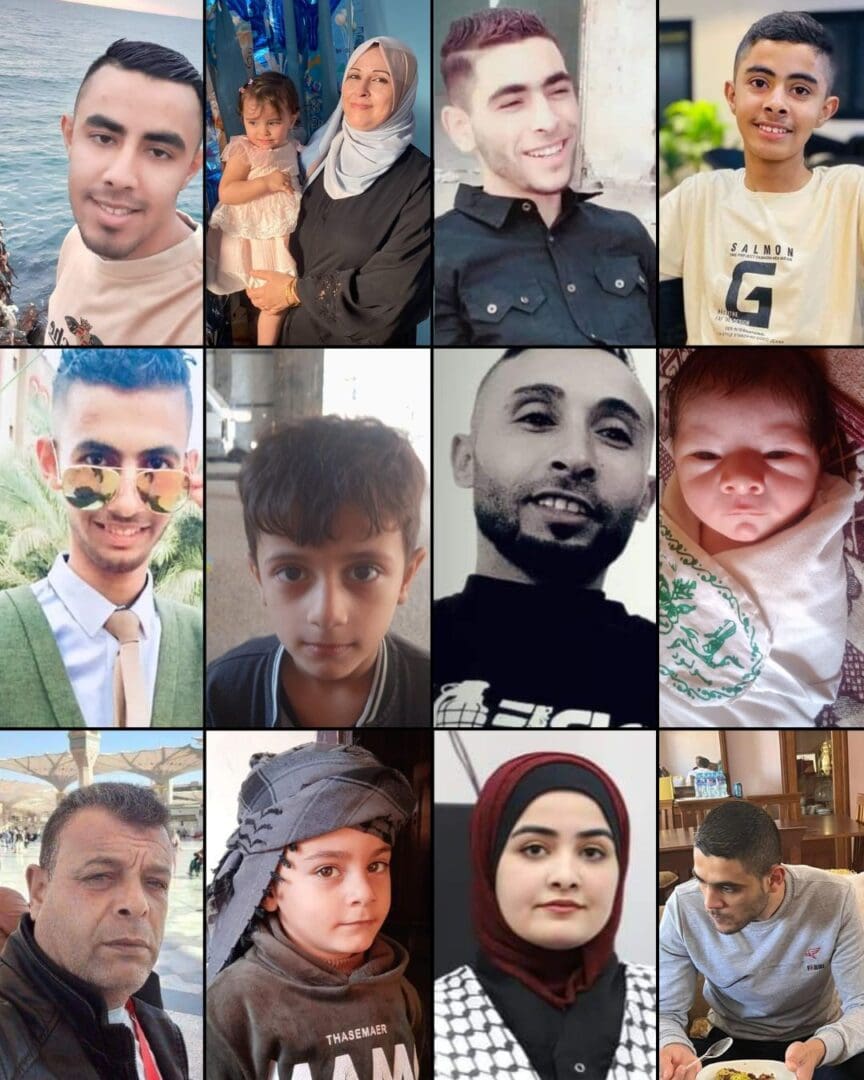
Suleiman Salman al-Najjar (48), who owns a car sales and repair shop, told Amnesty International that his wife Susanne Subhi Asalam Najjar (40) was killed along with four of their children: daughters Safa (17 months) and Farah (23), and sons Yazan (14) and Nadim (20).
He said: “I was feeling sick and went to the al-Aqsa Martyrs’ hospital, which is about two kilometres [away]. I suffer from kidney problems and since the pain was getting worse, I decided to go to the hospital to get an injection before it became too late in the night…
“I got the injection at the hospital, and then as I left and was heading back home in my car I saw a friend of mine and stopped the car to greet him. As we were talking, we heard a big explosion. I did not know where that bombardment was, and did not think it was my house… As I continued to talk with my friend someone said to me that it was my house that had just been bombed…
“Our lives have been destroyed in a moment. Our family has been destroyed. Something that was unthinkable is now our reality“
Suleiman Salman al-Najjar, whose wife and four children were killed
“I was shocked. I rushed home and saw a scene of utter destruction. I could not believe my eyes. Everybody was under the rubble. The house was completely pulverized. The bodies were reduced to shreds.
“Only the body of my son Nadim was recovered whole. My baby girl, Safa, we only found her hand… Now, me and my two surviving sons live in a tent by the ruins of our home. Our lives have been destroyed in a moment. Our family has been destroyed. Something that was unthinkable is now our reality.”
The al-Najjar’s neighbours – Yousef Baker Abu Traya (29), as well as Layla Said Ahmad al-A’awar (42) and her seven-year-old daughter Jana Hani al-A’awar – were also killed in the strike.
Analysis of satellite imagery of the site confirms destruction between the mornings of 10 and 13 October 2023.
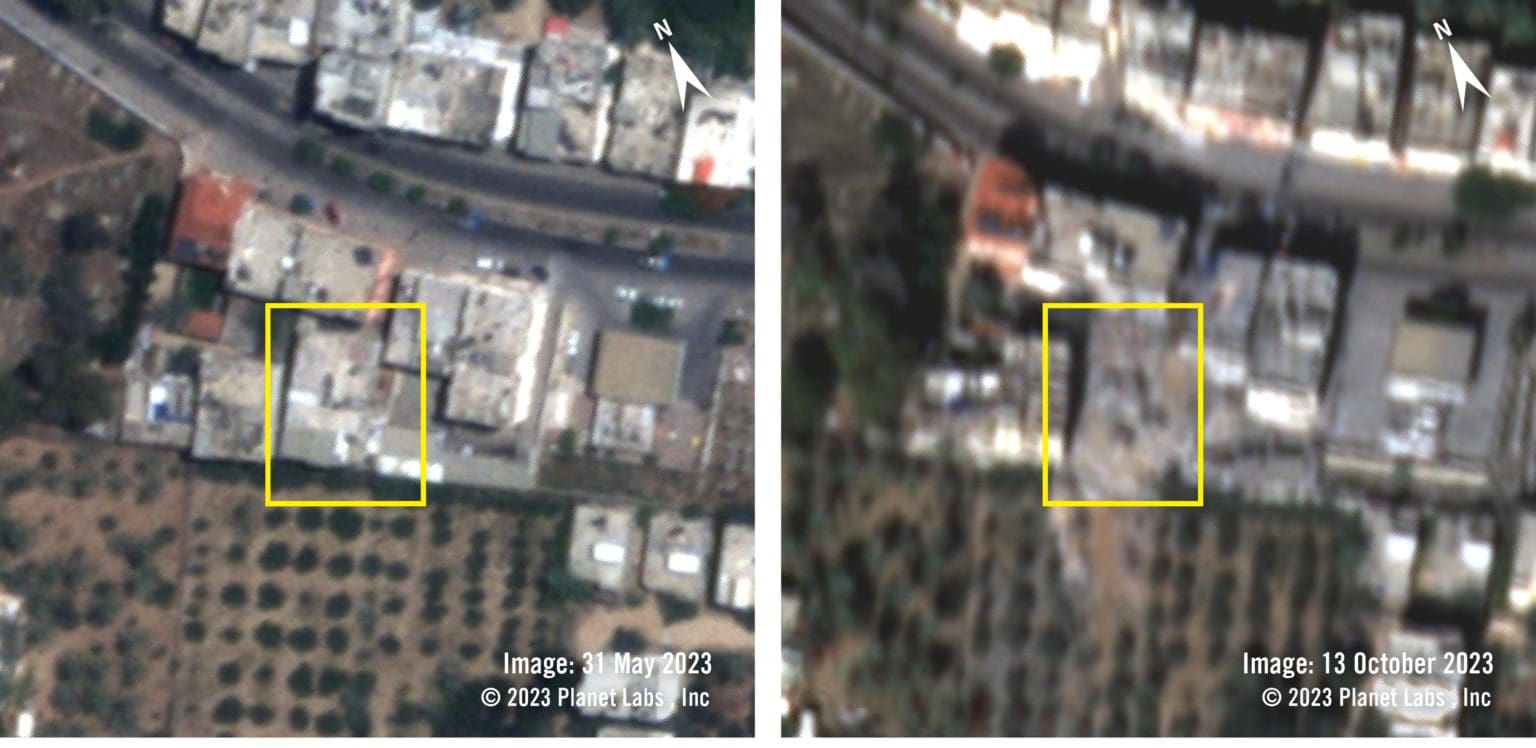
Abu Mu’eileq strike: ‘Why so much injustice?’
On 22 October at approximately 12pm, three houses belonging to three Abu Mu’eileq brothers and their families were hit by an Israeli air strike north of Deir al-Balah. In total, 18 members of the Mu’eileq family were killed – 12 children and six women – as well as their neighbour Rajab Ghazi Mezyed.
Samaher Abu Mu’eileq, who survived the strike, told Amnesty International: “I had just left the house where my sisters-in-law and my nephews and nieces were sitting, a minute before the house was bombed.
“I walked downstairs and just as I was opening my front door, my brother’s house next door was bombed. I was thrown against the door by the force of the explosion and was injured in my face and neck. I can’t understand why the house was bombed. My sisters-in-law and their children and my stepmother were killed, all of them women and children… Others were injured. What is the reason for such crime against civilians?”
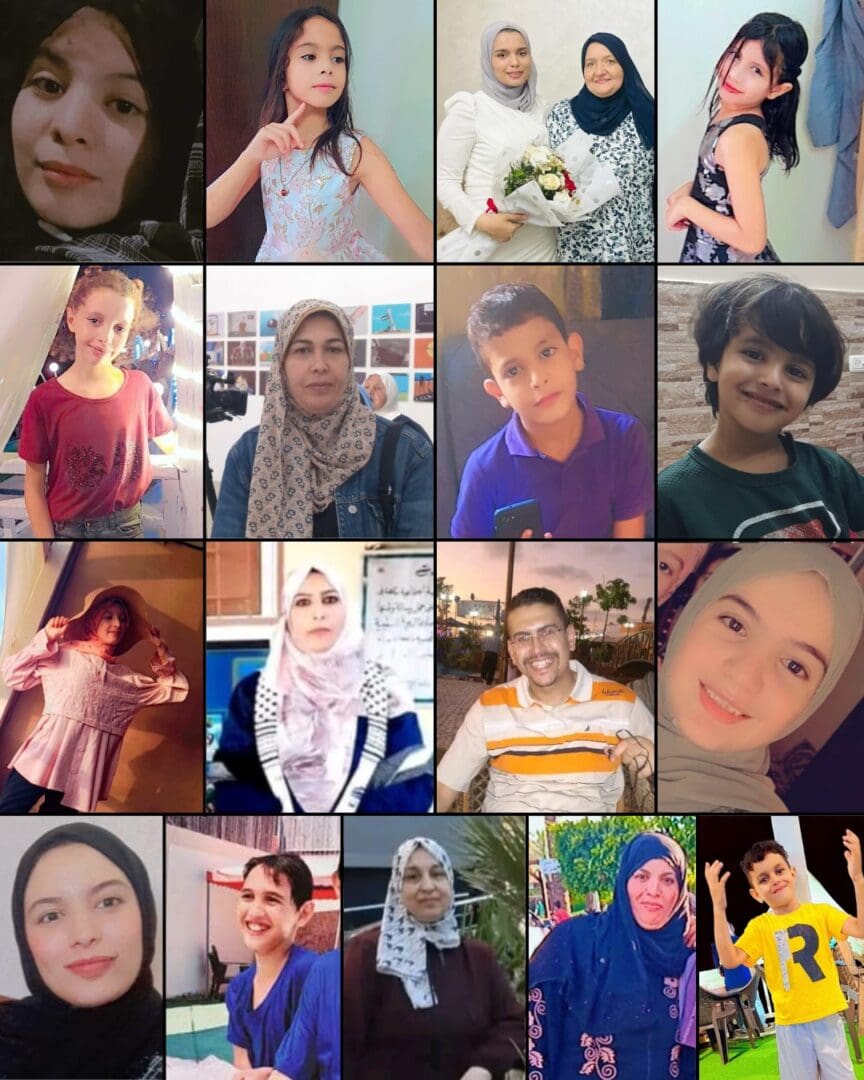
“What is the reason for such crime against civilians?“
Samaher Abu Mu’eileq, who survived the strike
Samaher’s brother, Bakir Abu Mu’eileq, an ear, nose and throat specialist, lost his wife Islam Majid Abu Mu’eileq (34) and four of their children – daughters Do’a (16) and Lama (11), and sons Ghanem (14) and Mohamed (12) – in the strike.
Bakir Abu Mu’eileq was working at the hospital close to the family home when the strike occurred. He told Amnesty International: “We are three brothers married to three sisters, living among ourselves, focused on our families and work and far from politics. We are doctors and scientists, and our focus is living a good life and building a good future for our children.”
“We cannot understand why our homes were bombed. We have never had any problem previously. It is the same for our neighbours. There is nobody armed or political here. Our lives, our families, were destroyed completely, obliterated. Why?
“The bodies were reduced to shreds. We could only find pieces… Only five of the bodies were recovered more or less whole because they were thrown further away [from the blast site]. We are in shock. What future is there now for my surviving daughters? Why so much injustice? Why?”
Analysis of satellite imagery from 22 October 2023 shows damage that occurred to structures on that day in that location.
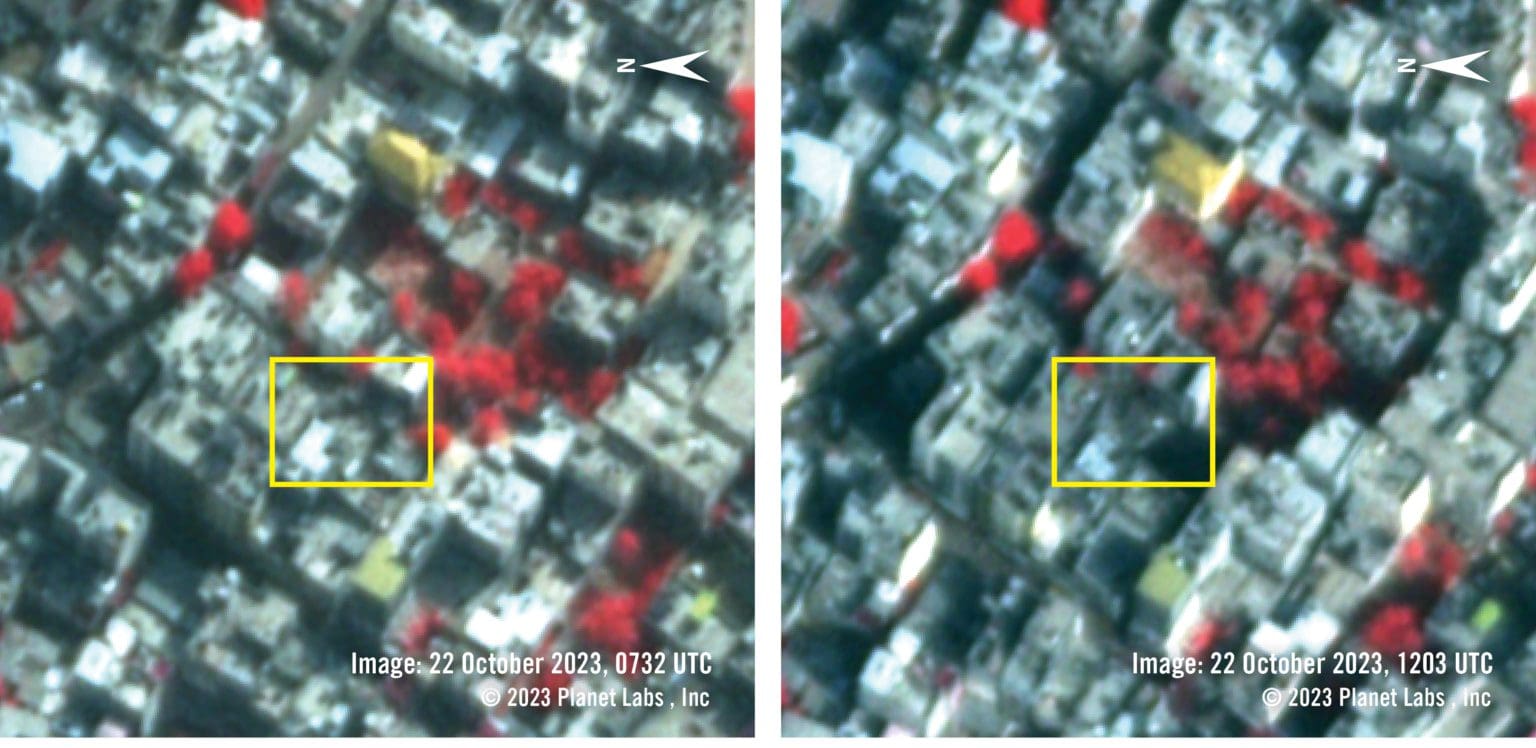
International humanitarian law and the obligation not to assist in violations
Parties to an armed conflict must at all times distinguish between civilians and civilian objects on one hand, and fighters and military objectives on the other. Direct attacks on civilians and civilian objects are prohibited, as are indiscriminate attacks.
When attacking a military objective, the Israeli military is obligated to take all feasible precautions to avoid, and in any event to minimize, death and injury to civilians and damage to civilian objects. Such precautions include doing all that is possible to verify that a target is a military objective; choosing means and methods of attack that minimize civilian harm; assessing whether an attack would be disproportionate; giving effective advance warning to civilians where feasible; and cancelling an attack should it become apparent that it would be unlawful.
Amnesty International did not find any indication that there were any military objectives at the site of the two strikes or that the people in the buildings were military targets, and did not receive evidence to the contrary from Israel, raising concerns that these strikes were direct attacks on civilians or on civilian objects. Amnesty International searched media articles for information on these attacks, and did not find any relevant statement from the Israeli authorities or other claim that there were military objectives present. Even if there had been a legitimate military objective in the vicinity of any of the buildings that were hit, these strikes failed to distinguish between military objectives and civilian objects.
Indiscriminate strikes that kill or injure civilians constitute war crimes. A longstanding pattern of reckless attacks that strike civilian objects, which Amnesty International has documented throughout Israel’s ongoing attacks, as well as during the 2008-9, 2014, and 2021 conflicts, may amount to directing attacks against civilians and civilian objects, which are also war crimes.
The extremely high population density in the besieged Gaza Strip entails additional challenges for all parties involved in the conflict. Hamas and other armed groups are required under international humanitarian law to take all feasible precautions to protect civilians under their control against the effects of attacks. This includes, to the extent feasible, avoiding locating military objectives within or near densely populated areas. In the attacks investigated here, Amnesty International did not find any indication of human shielding by Hamas, or even of the presence of fighters where the attacks occurred.
However, even if armed groups fail to fulfil their obligations, Israel remains bound by international humanitarian law, including prohibitions against indiscriminate and disproportionate attacks.
All states have an obligation to ensure respect for the rules of international humanitarian law, including by other states. The ICRC Commentary (2020) on common article 1 to the Geneva Conventions explains: “Financial, material or other support in the knowledge that such support will be used to commit violations of humanitarian law would therefore violate common Article 1.” US arms transfers to Israel, in the current circumstances, violate its obligations under the Geneva Conventions.
In addition, the US may share responsibility for serious violations of international humanitarian law committed by Israel with US-supplied weapons, as all states have a duty not to knowingly contribute to internationally wrongful acts by other states. The rules on state responsibility are rules of customary international law. They are reflected in the International Law Commission’s (ILC) Articles on Responsibility of States for Internationally Wrongful Acts (Articles on State Responsibility). According to Article 16 of the Articles on State Responsibility, a state can be considered to be responsible for assisting, or complicit in, a violation of international humanitarian law: when providing assistance, the assisting state “does so with knowledge of the circumstances of the internationally wrongful act”; and the act is such that it would have been wrongful had it been committed by the assisting state itself.
Background
On 07 October 2023, Hamas and other armed groups launched indiscriminate rockets and sent fighters into southern Israel and committed war crimes, such as deliberate mass killings of civilians and hostage taking. According to Israeli authorities, at least 239 people, mostly civilians, including 33 children, were taken as hostages by Hamas and other armed groups in Gaza. As of 01 December, 113 hostages held by Hamas and other armed groups in Gaza had been released and 240 Palestinians detainees and prisoners in Israel prisons have been released as part of an agreement during a ‘humanitarian pause’ that began on 24 November and ended on 01 December.
Amnesty International has documented damning evidence of war crimes by Israeli forces in their intense bombardment of Gaza, including direct or indiscriminate attacks as well as other unlawful attacks and collective punishment of the civilian population. According to the Palestinian Ministry of Health in Gaza, the attacks have killed more than 15,000 people, mostly civilians, including 5,500 children.
Amnesty International is calling for an immediate sustained ceasefire, the release of all remaining civilian hostages, and for Israel to end its illegal and inhumane siege of Gaza. Amnesty International is also calling for a comprehensive UN Security Council arms embargo on Israel, Hamas and other armed groups that covers the direct or indirect supply, sale or transfer of arms and military material, including related technologies, parts and components, technical assistance, training, financial or other assistance.
This output was produced by Amnesty International’s International Secretariat, 1 Easton Street, London, WC1X 0DW, UK.

